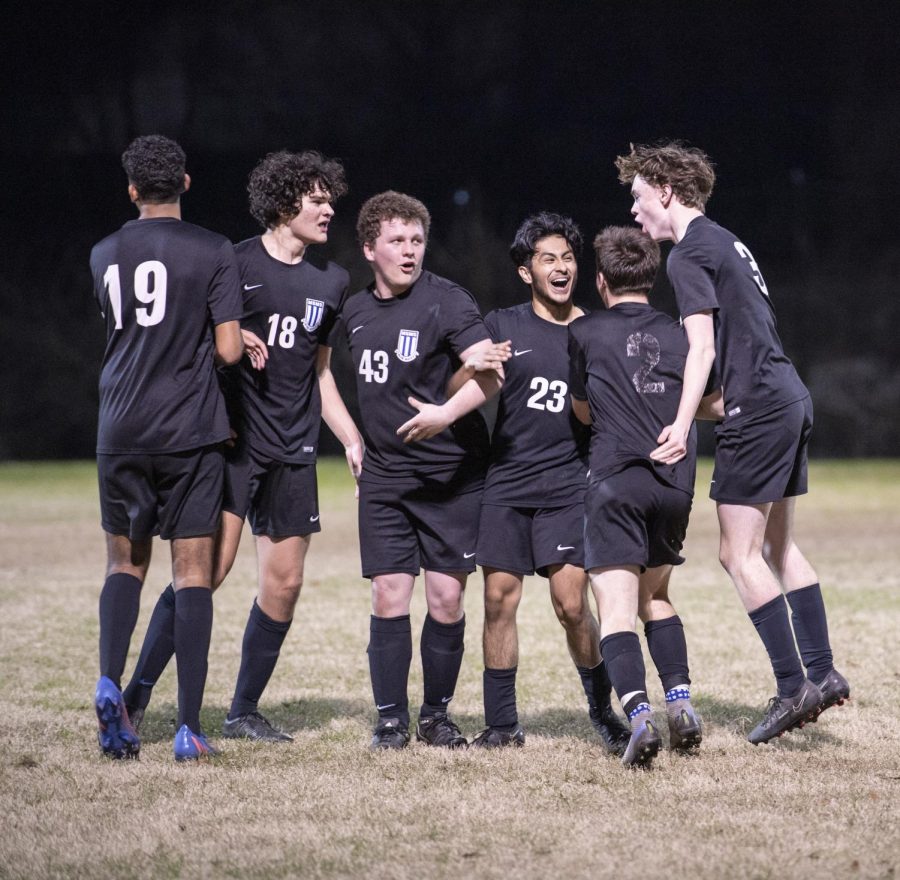Student-athletes balance academics, sports at MSMS
Seniors Sahib Gill, Nicholas Popescu, Isaac Riggins, Jeremy Padilla, Sawyer Levenson and Jeremy Dawe celebrate during their soccer match against Booneville on Jan. 16. Many students at MSMS have to strike a balance between their academic and athletic activities.
May 23, 2023
Neither “S” in MSMS has ever stood for “sports.” However, throughout its history, sports have been an integral part of student life at MSMS.
Executive Director Donnie Cook, who graduated in the inaugural class of 1990, said there were initially no sports when the school was first organized. However, he said he believes the sports that were established in subsequent years are beneficial for students.
“I think it’s great that we are doing competitive sports. For one, that’s an outlet [for stress relief], and team sports teach you a lot of good skills in life working as part of a group,” Cook said.
Cook admitted there are some who are concerned that MSMS students miss too much class time because of their participation in sports. However, he said he cautions each individual student-athlete to make sure they stay diligent in making up any work they miss in order to keep a healthy balance between sports and academics.
“I want sports to stay integral to the [MSMS] experience and I want that option to be there,” Cook said, “but I would caution students who are in sports to make sure they put their academics first. That can be a fine line that can be tough to balance sometimes.
“When we say student-athlete, we emphasize the student before the athlete. I think it’s an individual decision whether it’s beneficial for you or not,” Cook added.
Chuck Yarborough, who coached the Goen soccer team for nearly a decade, said he firmly believes in sports as a healthy outlet for stress relief and for building a community. He also said he saw a direct correlation between student-athletes and academic success.
“I took surveys of the students, and every year the girls soccer team’s ACT score average was higher than the school average,” Yarborough said. “Recently, I took a look at the MSMS Hall of Fame — the plaques in the hallway from the past 10 years or so — and on each of these plaques, I could identify that at least 35% or 45% of the Hall of Fame students had participated in sports.”
While many members of the MSMS community champion sports as a positive aspect of students’ lives, students are here for an accelerated education first and foremost. This begs the question of whether sports are more of a distraction than a supplement to learning.
Responding to the argument that students missing class time for sports is detrimental to their education, Yarborough said any student missing class for “extracurricular and co-curricular activities” is legitimate because they are “part of a complete education and part of the complete development of our students.”
Junior Ella Jones, who is a member of the MSMS soccer, tennis and track teams, said she has not missed a significant amount of class time due to sports compared to her school last year.
“We definitely have missed less school for sports at MSMS than I did at Long Beach,” Jones said. “I think playing sports here has helped me overall.”
Thomas Richardson also attended MSMS as a student before he joined the English department faculty. He said he remembers his experience on the now-dissolved MSMS basketball team as a way he relieved stress and stayed in a positive mindset, as well as a way he branched out socially.
“All around for me it was self-care. It made me very routine oriented and a lot more health-conscious,” Richardson said. “Playing basketball here gave me this other friend group that I wouldn’t necessarily have gravitated toward. We got pretty close, and I’m still close with some of them.”
Richardson emphasized any commitment to an extracurricular or hobby, whether that be a school sport, an instrument or a mentorship program, as a factor that helps students establish a healthy routine.
“I’ve never looked at the stats, but I feel like being involved in something that you’re passionate about outside of class is really a motivator to get you on the right path,” Richardson said.
In a recent poll, 76.3% of current students surveyed said they still would have applied to MSMS even if it did not offer school sports teams. This further supports Cook’s philosophy of prioritizing the student part of student-athlete.
Even though MSMS is by no means a sports school, students still choose to participate in them. Competing in high school team sports can be a respite from the stress of the school day. Playing sports can be an outlet to enjoy the present moment and not waste the last years of high school obsessing over the post-graduation future.
“The students who come here often are multitalented. For many of them, sports are a part of who they are,” Yarborough said. “If sports are a part of how somebody develops into who they are intended to be, I think that’s a good thing.”









